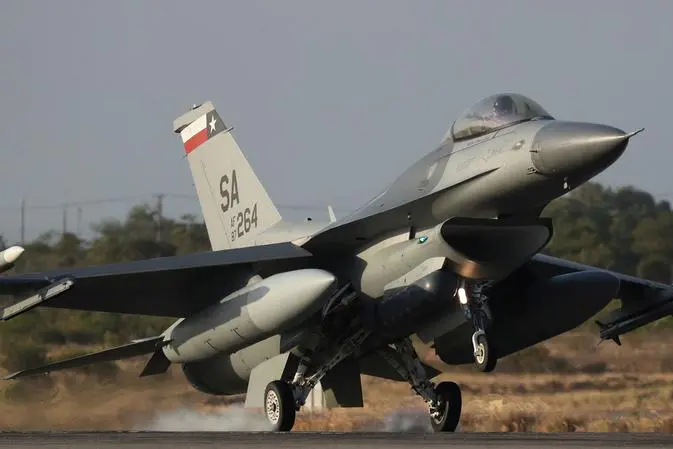PHOTO
Two U.S. fighter jets struck weapons and ammunition facilities in Syria on Friday in retaliation for attacks on U.S. forces by Iranian-backed militia as concerns grew that the Israel-Hamas conflict may spread in the Middle East.
U.S. President Joe Biden ordered strikes on the two facilities used by Iran's Revolutionary Guard Cops and militia it backs, the Pentagon said, warning the U.S. will take additional measures if attacks by Iran's proxies continue.
U.S. and coalition troops have been attacked at least 19 times in Iraq and in Syria by Iran-backed forces in the past week. Hamas, Islamic Jihad and Lebanon's Hezbollah are all backed by Tehran.
Iranian Foreign Minister Hossein Amirabdollahian said at the United Nations on Thursday that if Israel's offensive against Hamas did not stop, the United States will "not be spared from this fire".
The U.S. air strikes took place at roughly 4:30 a.m. on Friday in Syria (0130 GMT) near Abu Kamal, a Syrian town on the border with Iraq, and were carried out by two F-16 fighter jets using precision munitions, a U.S. defence official said.
"These precision self-defence strikes are a response to a series of ongoing and mostly unsuccessful attacks against U.S. personnel in Iraq and Syria by Iranian-backed militia groups that began on October 17," U.S. Defense Secretary Lloyd Austin said in a statement.
"These Iranian-backed attacks against U.S. forces are unacceptable and must stop," Austin said.
Biden has sent a rare message to Iranian Supreme Leader Ayatollah Ali Khamenei warning Tehran against targeting U.S. personnel in the Middle East, the White House said earlier on Thursday.
"What we want is for Iran to take very specific actions, to direct its militias and proxies to stand down," a senior U.S. defence official said. The United States did not coordinate the air strikes with Israel, the official added.
Israel said on Friday military raids into Gaza were preparing "the next stage of the operation", amid fears that a ground invasion of the Palestinian enclave could spark a wider Middle East conflict.
Israel has bombarded the densely populated Gaza Strip following the Oct. 7 Hamas attack on Israeli communities. Israel says Hamas killed some 1,400 people including children, and took more than 200 hostages, some of them infants and older adults.
The Hamas-controlled Gaza health ministry said on Thursday that 7,028 Palestinians had been killed in the retaliatory air strikes, including 2,913 children.
Reuters could not independently verify the tolls.
A missile launched as part of fighting between Hamas and Israel struck an Egyptian resort town about 220 km (135 miles) from the Gaza Strip early on Friday, Egypt's Al Qahera News reported, citing sources.
The missile hit a medical facility in Taba, injuring at least six people, Al Qahera TV reported. A witness in Taba confirmed hearing an explosion and seeing smoke rising, but Reuters was not immediately able to identify the blast's source.
Taba straddles Egypt's border with Israel's Red Sea port of Eilat. Israel's military said it was aware of a security incident outside its borders.
Reuters was not immediately able to confirm the reports.
ISRAEL SAYS HITS HAMAS COMMANDERS
Israel said on Friday that its fighter jets had struck three senior Hamas operatives in the Daraj Tuffah Battalion, part of the Gaza City Brigade. Israel said the three commanders had played a significant role in the Oct. 7 attack on Israel.
There was no official announcement by Hamas.
Palestinian militants clashed with Israeli troops in at least two areas of the Gaza Strip on Friday, Hamas-affiliated media reported.
Israeli military vehicles raided the central area of Al-Bureij and troops were clashing with militants near the border there, the reports said. In the south, in a border area near the town of Rafah, Hamas militants were trading fire with Israeli troops, according to the reports.
Reuters was unable to immediately confirm the reports.
As the plight of Palestinian civilians grows more desperate, the issue of whether to have humanitarian pauses or ceasefire agreements in the Hamas-run coastal enclave will come before the 193-member U.N. General Assembly on Friday in a draft resolution submitted by Arab states calling for a ceasefire.
Unlike in the Security Council where resolutions on Gaza aid failed this week, no country holds a veto in the General Assembly. Resolutions are non-binding, but carry political weight.
"To say that the humanitarian situation in Gaza is catastrophic is an understatement. Everything that is needed to sustain life is missing or dwindling by the hour in Gaza," said Mamadou Sow, head of the International Committee of the Red Cross' regional delegation.
More than 613,000 people were estimated to have been made homeless by the Israeli bombardment of Gaza and were being sheltered by the United Nations agency for Palestinian refugees, UNRWA.
US SENDS MORE TROOPS
Governments in the West and the Middle East are concerned about a wider regional conflict developing if Israel continues its bombardment of Gaza or mounts a ground invasion in response to the surprise attack by Hamas.
Israel and Lebanon-based Hezbollah have already exchanged fire and Israel has targeted Syrian army infrastructure and airports.
The United States has sent warships and fighter aircraft to the region over the last three weeks. On Thursday the Pentagon said about 900 more U.S. troops have arrived in the Middle East or are heading there to bolster air defences for U.S. personnel.
For Israel's part, Defence Minister Yoav Gallant, asked at a press conference about the possibility of a confrontation with Iran, said Israel has "no interest in expanding the war."
(Reporting by Nidal al-Mughrabi, Tala Ramadan, Emily Rose, Adam Makary, Jeff Mason, Phil Stewart, Michelle Nichols, Gabriela Baczynska and Andrew Gray; Writing by Grant McCool and Michael Perry; Editing by Cynthia Osterman, Simon Cameron-Moore and Raju Gopalakrishnan)





















